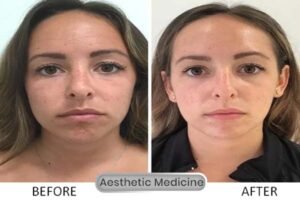Aesthetic Medicine

Aesthetic medicine, also known as cosmetic medicine or aesthetic dermatology, focuses on enhancing a person’s appearance through various non-surgical and minimally invasive procedures.
Here’s an overview of its aspects:
Aesthetic medicine encompasses a wide range of procedures aimed at improving the aesthetic appearance of the face, skin, body, and hair. These procedures are typically elective and sought out by individuals who wish to address signs of aging, enhance facial features, or improve their overall appearance.
Consulting with a qualified aesthetic practitioner or dermatologist is essential to discuss treatment options, expectations, and potential risks associated with aesthetic procedures. By addressing aesthetic concerns, individuals can achieve a rejuvenated appearance and improved self-confidence.
Unlike traditional medical conditions, aesthetic concerns are often subjective and may include:
Wrinkles and Fine Lines: Lines and creases on the face, particularly around the eyes (crow’s feet), forehead, and mouth.
Volume Loss: Loss of volume or sagging skin, leading to hollowed cheeks, sunken under eyes, or thinning lips.
Uneven Skin Tone: Discoloration, pigmentation issues, or age spots that contribute to an uneven complexion.
Acne Scars: Scars or indentations left behind by acne breakouts, which can affect skin texture and appearance.
Unwanted Hair: Excessive or unwanted hair growth on the face or body, which can be a source of cosmetic concern.
Aesthetic concerns can arise due to various factors, including:
Aging: Natural aging processes result in the breakdown of collagen and elastin fibers, leading to wrinkles, volume loss, and skin laxity.
Sun Damage: Prolonged exposure to ultraviolet (UV) radiation from the sun accelerates skin aging, causing wrinkles, pigmentation issues, and sunspots.
Genetics: Inherited traits, such as facial structure, skin type, and hair growth patterns, can influence one’s aesthetic appearance.
Lifestyle Factors: Poor skincare habits, smoking, excessive alcohol consumption, and unhealthy diet can contribute to premature aging and skin damage.
Hormonal Changes: Fluctuations in hormone levels, particularly during puberty, pregnancy, or menopause, can affect skin condition and hair growth.
Aesthetic medicine offers a variety of treatments to address cosmetic concerns, including:
Injectables: Botulinum toxin (Botox) and dermal fillers are commonly used to reduce wrinkles, restore volume, and enhance facial contours.
Chemical Peels: Chemical solutions are applied to the skin to exfoliate dead cells, improve skin texture, and reduce hyperpigmentation.
Laser Therapy: Laser and light-based treatments target specific skin concerns, such as wrinkles, acne scars, or unwanted hair, by stimulating collagen production or destroying pigmented cells.
Microdermabrasion: Mechanical exfoliation technique that removes dead skin cells, resulting in smoother, brighter skin.
Cosmetic Dermatology: Procedures such as microneedling, PRP therapy, and thread lifts can improve skin texture, stimulate collagen production, and lift sagging skin.

